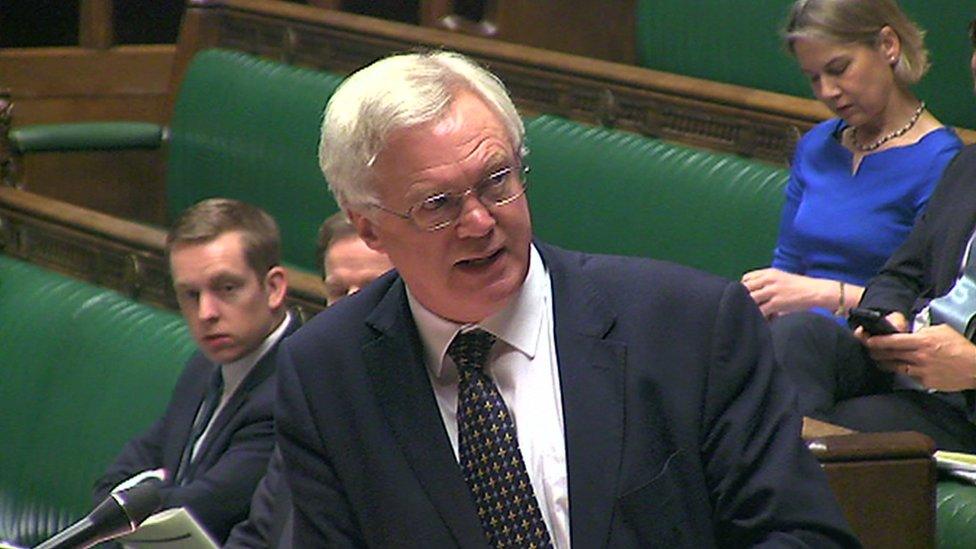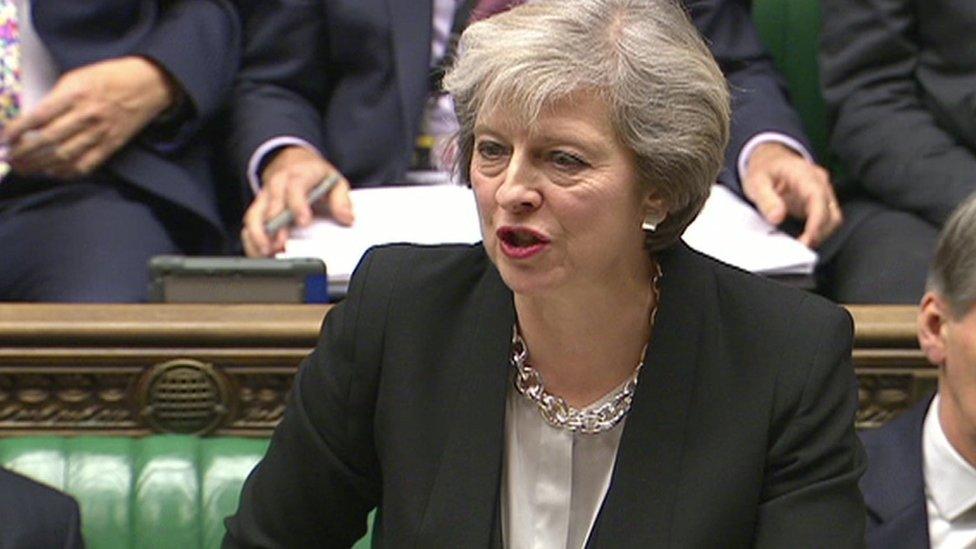David Davis: UK may pay for access to EU single market
- Published
- comments

The UK would consider making payments to the EU after it leaves the bloc to secure the best possible access to the EU single market, Brexit Secretary David Davis has said.
Mr Davis told MPs the "major criterion" was getting the best access for goods and services to the European market.
"And if that is included... then of course we would consider it."
But Brexit-backing Tory Peter Bone said "people would be absolutely outraged" if the UK continued to pay the EU.
Later, in a speech to CBI Wales in Cardiff, Mr Davis sought to reassure business leaders that immigration controls after Brexit will not be imposed "in a way that it is contrary to the national and economic interest".
On Thursday in the Commons, Labour MP Wayne David asked Mr Davis: "Will the government consider making any contribution in any shape or form for access to the single market?"
Mr Davis replied: "The major criterion here is that we get the best possible access for goods and services to the European market - and if that is included in what you are talking about, then of course we will consider it."
His comments prompted sterling to rise by 1% to $1.26 against the dollar.
But Mr Bone told the BBC: "People will be absolutely outraged if we came out of the EU and then carried on paying them £15bn a year, £20bn a year, whatever the figure is - no I don't think it's going to happen."
However, Chancellor Philip Hammond said Mr Davis was "absolutely right not to rule out the possibility that we might want to contribute in some way to some form of mechanism".
He said: "You can't go into any negotiation expecting to get every single objective that you set out with and concede nothing along the way - it will have to be a deal that works for both sides."
But prominent Leave campaigner and former Conservative cabinet minister Iain Duncan Smith said Mr Davis had been simply not ruling anything in or out of the government's Brexit negotiations.
"I don't think there's any way in which you can reach a deal where you can say 'I'll pay some money in and therefore you allow us access' because you might as well have tariff barriers," he told BBC Radio 4's World at One programme.
'Strange' negotiations
And Labour leader Jeremy Corbyn was sceptical about Mr Davis's suggestion. "The idea of paying for access? I'm not really sure what that means," he said.
"If Europe puts tariff barriers against products coming from Britain, the government's going to pay all the tariffs - that sounds a very strange way of entering the negotiations when you're trying to get market access both ways. It doesn't sound a very well thought-out policy."

What is the single market?
In the early 1990s the European common market grew into the single market we know today.
At its heart is a free trade area, which is a market where there are no tariffs or taxes on trade between countries. While its members can trade freely with each other, they also impose common tariffs on imports from non-EU countries.
Being a member of the single market means a country gets the benefit of any trade deal struck between the EU and other countries - the flip side is that member states cannot set their own tariffs.
But the EU's single market is much more than a straightforward free trade area, because it also includes the free movement of goods, people and capital.
Crucial to the single market is a common framework of regulations that mean companies in countries such as the UK, France, Italy or Poland have to abide by common standards - whether they trade across the EU or not. That is to stop one business or country having an unfair advantage. Most countries in the single market also have a single currency - the euro - but the UK did not adopt it.

The prime minister's spokeswoman said the Brexit secretary had only been repeating government policy on leaving the EU.
"What he said in the House this morning is consistent with what we have said... that it will be for the UK government to make decisions on how taxpayers' money will be spent," she said.
"As we approach these negotiations we want to get the best possible access for British business to trade with, and operate within, the single market, while also taking back control of immigration."
Liberal Democrat leader Tim Farron accused the government of "sending mixed signals" and of being "in an absolute mess".
He added: "How can the government claim they have a mandate for their Brexit deal when they don't even know what it is themselves?"
Iain Duncan Smith tells The World At One that paying for single market access would be the same as tariffs
Mr Davis confirmed that Article 50, which sparks the formal legal process for leaving the EU, would be triggered by 31 March, 2017 and said the government was seeking "a smooth and orderly exit" from the EU and was "examining all possible options, focusing on the mutual interests of the UK and the European Union".
The Brexit secretary also defended Foreign Secretary Boris Johnson, who according to Sky News had privately told four EU ambassadors he backed free movement.
Mr Davis said the comments were "at odds" with what he knew of Mr Johnson's views.
"He believes very clearly - and he made this very clear in the Leave campaign because he was a much more major part of it than I was - that some immigration is useful. We all agree on that," he said.
"That's not the same as thinking free movement of people as it now stands is a good idea. It's a problem."
In a speech to business leaders in Wales later he said that "no-one wants to see labour shortages in key sectors" and that Britain "must win the global battle for talent".
"As we take back control of immigration by ending free movement as it has operated before, let me also say this: We won't do so in a way that it is contrary to the national and economic interest," he said.
Speaking from Rome, Mr Johnson insisted he had told the ambassadors during a breakfast meeting "that immigration had been a good thing for the UK in many respects - but it had got out of control and that we needed to take back control. I think you will find the record reflects that".
- Published1 December 2016
- Published30 November 2016
